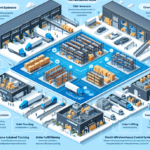Blue Yonder (formerly JDA Software) WMS vs Fishbowl Inventory
In today's fast-paced business environment, effective inventory management is crucial for success. Warehouse Management Systems (WMS) equip businesses with the tools to optimize and streamline their inventory processes. Blue Yonder (formerly JDA Software) WMS and Fishbowl Inventory are two leading WMS solutions currently on the market. This article compares their features, pricing, implementation processes, customer support, integration capabilities, user interfaces, and security features to help you determine which system best suits your business needs.
Understanding Warehouse Management Systems (WMS)
A warehouse management system (WMS) is software designed to assist businesses in managing and organizing their warehouse or distribution center operations. These systems enhance inventory management by tracking inventory levels, automating order fulfillment, improving supplier relationships, and providing real-time visibility into inventory locations within the warehouse.
One of the primary benefits of using a WMS is the reduction of errors in inventory management. According to a Inbound Logistics report, real-time tracking and automation minimize the risk of overstocking or stockouts, which can lead to lost sales and decreased customer satisfaction. Additionally, a WMS can help businesses save time and money by streamlining warehouse operations, reducing labor costs, and enhancing overall efficiency.
Another significant feature of WMS is the ability to generate detailed reports and analytics. These reports offer valuable insights into inventory levels, order fulfillment rates, and supplier performance. By analyzing this data, businesses can make informed decisions about their inventory management strategies, identify areas for improvement, and optimize operations for maximum efficiency and profitability.
Blue Yonder WMS: Features and Capabilities
Overview of Blue Yonder WMS
Blue Yonder WMS, formerly known as JDA Software WMS, is a cloud-based warehouse management solution tailored for small, midsize, and large enterprises. It helps businesses optimize and automate their warehouse and distribution center operations through real-time inventory tracking, labor management, and advanced warehouse optimization strategies. Users can access their data from any device, anywhere, providing flexibility and accessibility for businesses of all sizes.
Key Features
- Real-time inventory tracking and visibility
- Automated order fulfillment
- Labor management and optimization tools
- Dynamic slotting and wave picking options
- Customizable reporting and analytics
- User-friendly interface with customizable dashboards
- Advanced security features including data encryption and role-based access
Integration and Scalability
Blue Yonder WMS seamlessly integrates with other systems such as transportation management systems (TMS) and enterprise resource planning (ERP) software. This integration ensures a smooth flow of data across different departments, enhancing overall operational efficiency and accuracy. Additionally, Blue Yonder WMS is highly scalable, allowing it to grow with your business and accommodate increasing inventory complexities.
Advanced Analytics and Forecasting
The system offers robust analytics and forecasting capabilities, enabling businesses to gain deep insights into their warehouse operations. Customizable dashboards and real-time data visualization help monitor key performance indicators (KPIs) and identify areas for improvement, facilitating data-driven decision-making.
Fishbowl Inventory: Features and Capabilities
Overview of Fishbowl Inventory
Fishbowl Inventory is a comprehensive inventory management solution designed to help businesses manage inventory and manufacturing processes efficiently. It offers features such as inventory tracking, order management, manufacturing management, and purchasing management, all integrated into a single platform. Fishbowl Inventory automates reorder points, sets inventory alerts, and tracks inventory levels in real-time to streamline inventory management.
Key Features
- Comprehensive inventory tracking and management
- Order management and fulfillment automation
- Manufacturing management tools
- Purchasing and supplier management
- Robust reporting and analytics
- User-friendly interface
- Security features including user authentication and data backup
Integration and Compatibility
Fishbowl Inventory integrates seamlessly with popular accounting software such as QuickBooks and Xero, allowing businesses to synchronize inventory and financial data effortlessly. This integration reduces the risk of errors and saves time by eliminating the need for manual data entry. Additionally, Fishbowl offers integrations with various e-commerce platforms and CRM systems, enhancing its functionality and adaptability to different business needs.
Customization and Reporting
The software provides customizable reports that empower businesses to analyze their inventory data comprehensively. These insights enable informed decision-making regarding inventory strategies, helping businesses optimize their operations for better efficiency and profitability.
Comparative Analysis: Blue Yonder WMS vs Fishbowl Inventory
Features and Benefits
Both Blue Yonder WMS and Fishbowl Inventory offer a range of features designed to enhance inventory management. Blue Yonder stands out with its advanced analytics, forecasting capabilities, and extensive integration options, making it suitable for larger businesses with complex needs. Fishbowl Inventory, on the other hand, is known for its user-friendly interface, affordability, and strong integration with accounting software, making it an excellent choice for small to medium-sized enterprises.
Pricing Models
Blue Yonder WMS operates on a subscription-based pricing model, with costs varying based on the number of users and required features. While this may appear more expensive initially, it includes ongoing updates and support, potentially saving money in the long run. Fishbowl Inventory charges a one-time licensing fee with additional support fees, which may be more cost-effective for businesses seeking a lower upfront investment.
Implementation Processes
Blue Yonder WMS offers a cloud-based implementation, allowing businesses to start using the system quickly without the need for extensive hardware or software installations. It also provides comprehensive training and support, ensuring a smooth transition. Fishbowl Inventory requires on-premise installation, which may be more time-consuming and require technical expertise. However, it also offers robust training and support options to assist businesses during implementation.
Customer Support
Both systems provide multiple customer support channels, including phone, email, and online resources. Blue Yonder WMS offers personalized training sessions and dedicated support teams to help businesses maximize the system's potential. Fishbowl Inventory provides on-site training and responsive support, catering to businesses that prefer hands-on assistance.
Integration Capabilities
Blue Yonder WMS integrates with a wide range of software systems, including ERP, CRM, and TMS, facilitating seamless data flow across various business functions. Fishbowl Inventory excels in integration with accounting software like QuickBooks and Xero, as well as e-commerce platforms and CRM systems, providing flexibility for different business environments.
User Interface and Experience
Both Blue Yonder WMS and Fishbowl Inventory offer intuitive and user-friendly interfaces. Blue Yonder's interface is modern and highly customizable, allowing users to tailor dashboards and workflows to their preferences. Fishbowl Inventory's interface is straightforward and easy to navigate, making it accessible even for users with limited technical experience.
Security Features
Security is a critical aspect of any WMS. Blue Yonder WMS provides advanced security measures, including data encryption, role-based access control, and data backup and disaster recovery solutions. Fishbowl Inventory offers robust security features such as user authentication, data backup, and automatic data archiving to protect sensitive information.
Pros and Cons of Blue Yonder WMS and Fishbowl Inventory
Blue Yonder WMS
- Pros:
- Highly scalable and customizable
- Advanced reporting and analytics
- Comprehensive integration capabilities
- Personalized training and implementation support
- Cloud-based for flexibility and accessibility
- Cons:
- Higher initial costs compared to some competitors
- Requires a reliable internet connection for cloud access
Fishbowl Inventory
- Pros:
- Affordable one-time licensing fee
- User-friendly interface
- Strong integration with accounting and e-commerce platforms
- On-premise installation offers more control
- Robust customer support and training
- Cons:
- Limited advanced reporting capabilities
- Ongoing support fees can add to long-term costs
- Less suitable for very large or complex operations
Implementation Process: Blue Yonder WMS vs Fishbowl Inventory
Blue Yonder WMS Implementation
Blue Yonder WMS offers a streamlined, cloud-based implementation process, enabling businesses to deploy the system quickly without extensive hardware requirements. The platform provides comprehensive online training resources and a dedicated support team to assist with setup and onboarding, ensuring a smooth transition.
Fishbowl Inventory Implementation
Fishbowl Inventory requires on-premise installation, which may involve more time and technical expertise. However, the company provides detailed documentation, on-site training, and robust support to facilitate the implementation process. The more standardized system reduces customization time, making it a suitable option for businesses seeking a quicker deployment.
Customer Support: Blue Yonder WMS vs Fishbowl Inventory
Effective customer support is vital for maximizing the benefits of a WMS. Blue Yonder WMS offers extensive support options, including personalized training sessions, dedicated account managers, and a wealth of online resources such as webinars and knowledge bases. This comprehensive support ensures that businesses can fully leverage the system's capabilities.
Fishbowl Inventory also provides robust customer support, including on-site training, responsive technical assistance, and a comprehensive library of online resources. Their support teams are trained to help businesses troubleshoot issues and optimize their use of the software, ensuring minimal downtime and enhanced productivity.
Integration Capabilities: Blue Yonder WMS vs Fishbowl Inventory
Integration with other business systems is essential for seamless operations. Blue Yonder WMS offers a wide range of integrations with ERP, CRM, TMS, and other enterprise software, enabling a unified data flow across various business functions. This broad integration capability enhances operational efficiency and data accuracy.
Fishbowl Inventory excels in integrating with accounting software like QuickBooks and Xero, as well as e-commerce platforms and CRM systems such as Salesforce and Magento. These integrations allow businesses to synchronize financial, sales, and inventory data, reducing manual data entry and minimizing errors.
User Interface Comparison: Blue Yonder WMS vs Fishbowl Inventory
User experience plays a crucial role in the effective use of a WMS. Blue Yonder WMS features a clean, modern interface that is highly customizable, allowing users to tailor dashboards and workflows to their specific needs. This flexibility enhances user adoption and efficiency.
Fishbowl Inventory offers a straightforward and intuitive interface that is easy to navigate, even for users with limited technical expertise. The simplicity of the interface ensures that employees can quickly learn and utilize the system, reducing training time and increasing productivity.
Security Features: Blue Yonder WMS vs Fishbowl Inventory
Both Blue Yonder WMS and Fishbowl Inventory prioritize data security. Blue Yonder WMS implements advanced security measures, including data encryption, role-based access control, and comprehensive data backup and disaster recovery solutions. These features ensure that sensitive information is protected against unauthorized access and potential data breaches.
Fishbowl Inventory also offers robust security features such as user authentication, regular data backups, and automatic data archiving. These measures safeguard business data and ensure compliance with industry standards and regulations, providing peace of mind to businesses using the platform.
Real-World Applications: Case Studies
Blue Yonder WMS
Walmart: One of the world's largest retailers, Walmart, utilizes Blue Yonder WMS to streamline its inventory management across its extensive supply chain. The cloud-based system has enabled Walmart to increase operational efficiency, optimize workforce management, and enhance real-time inventory visibility, contributing to better customer service and reduced costs.
Fishbowl Inventory
Mountainside Medical Equipment: A small e-commerce business, Mountainside Medical Equipment, leverages Fishbowl Inventory to manage inventory levels, streamline order fulfillment, and integrate with their e-commerce sales channels. This integration has improved their inventory accuracy, reduced fulfillment times, and enhanced overall business efficiency.
Future Trends in Warehouse Management Systems
The future of warehouse management systems is poised for significant advancements, driven by technological innovations and evolving business needs. Key trends include:
- Increased Adoption of Cloud-Based Solutions: Businesses are increasingly moving towards cloud-based WMS for their scalability, flexibility, and cost-effectiveness. Cloud solutions offer real-time data access and eliminate the need for extensive on-premise infrastructure.
- Integration of Artificial Intelligence (AI) and Machine Learning (ML): AI and ML are being integrated into WMS to enhance predictive analytics, optimize inventory forecasting, and automate decision-making processes, leading to more efficient warehouse operations.
- IoT and Automation: The Internet of Things (IoT) and automation technologies are transforming warehouse operations by enabling real-time tracking of inventory, automating repetitive tasks, and improving overall operational efficiency.
- Sustainability and Green Warehousing: There is a growing emphasis on sustainable practices within warehouse management, including energy-efficient systems, waste reduction, and environmentally friendly materials handling processes.
- Enhanced Data Security: As warehouses become more digitized, the focus on data security will intensify, with WMS providers implementing more advanced security protocols to protect sensitive business data.
Staying abreast of these trends will enable businesses to adopt innovative WMS solutions that drive efficiency, reduce costs, and enhance overall competitiveness in the market.
Conclusion: Choosing the Right WMS for Your Business
Selecting between Blue Yonder WMS and Fishbowl Inventory ultimately depends on your business's specific needs and requirements. Blue Yonder WMS is ideal for larger enterprises seeking advanced features, extensive integration capabilities, and scalable solutions to handle complex warehouse operations. Its robust analytics, forecasting tools, and personalized support make it a powerful choice for businesses aiming to optimize their supply chain management comprehensively.
Conversely, Fishbowl Inventory is well-suited for small to medium-sized businesses looking for an affordable, user-friendly inventory management solution with strong integration with accounting and e-commerce platforms. Its straightforward implementation and ease of use make it an attractive option for businesses seeking to enhance their inventory processes without significant upfront investments.
By carefully evaluating your business's operational needs, budget constraints, and growth plans, you can make an informed decision between Blue Yonder WMS and Fishbowl Inventory, ensuring that your chosen system effectively supports your inventory management goals and drives business success.




















